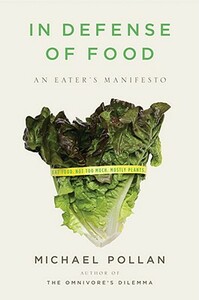You need to sign in or sign up before continuing.
Take a photo of a barcode or cover
Kind of a been there done that feel to me. The scientific discussions were largely unscientific with many of the most important facts relegated to footnotes in order to simplify a rather complex message. Pollan does to nutrition science what he claims nutrition science has done to us: overlooks essential elements. You cannot discuss science without an understanding of its methods. Comparing ethnographic and historical results from the 19th and early 20th century to today's food issues are interesting, but deeply less than causal. But then again, this is a New York Times Bestseller so I should have known it was more about staying on message than about weighing difficult and often contradictory evidence.
informative
reflective
medium-paced
Interesting to read about the distinction between nutritionism and whole food studies, but sometimes bounced around/gave too much extra information that I didn't find helpful. Part III was the most useful, made this worth the read.
I feel like I need to start shopping at Whole Foods now. Thought it was really interesting though, raised a lot of good arguments about why Americans are fat/unhealthy, excluding their fast food addiction. Next on my list is Fast Food Nation, though.
I always enjoy books that delve into the culture and politics that make up our food today.
A very concise picture of how the food and nutrition industries evolved over the past century to the point where we now mostly eat "food-like products" instead of food. If you're wondering why news reports about medical studies are so contradictory, read this book.
While the rules for eating aren't anything we haven't heard before from Pollan himself and others, coming after such a clear explanation, they have new power to motivate and inform choices. He also differentiates himself from folks like Andrew Weil, who offers similar advice, in his position on vitamin supplements (with the exception of fish oil supplements).
Michael Pollan is one of the best prose writers out there right now and this book lives up to that talent.
While the rules for eating aren't anything we haven't heard before from Pollan himself and others, coming after such a clear explanation, they have new power to motivate and inform choices. He also differentiates himself from folks like Andrew Weil, who offers similar advice, in his position on vitamin supplements (with the exception of fish oil supplements).
Michael Pollan is one of the best prose writers out there right now and this book lives up to that talent.
informative
reflective
medium-paced
I agree with Rick's review - In Defense of Food might have served better as an afterward or conclusion to Pollan's Omnivore's Dilemma rather than as a separate book. Still, it had good (albeit a little dry) information and insights about our eating culture, and it made me take a good look at my own "orthorexia." The profundities I'll walk away with are a lessened fear of animal fats, a renewed goal to eat slower, and a reminder to listen to my body and nurture a healthy legacy of food traditions and culture for my daughter.
Truly eye-opening. A great read for anyone living in American and eating the standard Western diet. Pollan is a great journalist. His writing is informative as well as captivating and he doesn't get too doomsday on you. Read it if you care about your health and that of future generations.



